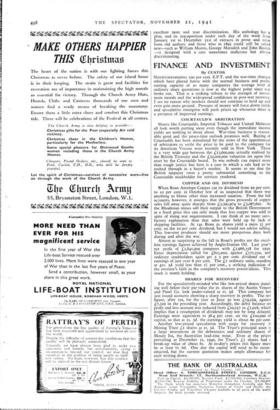FINANCE AND INVESTMENT
By CUSTOS
NOTWITHSTANDING 100 per cent. E.P.T. and the war-time changes which have played havoc with the normal business and profit- earning capacity of so many companies the average level of ordinary share quotations is now at the highest point since war broke out. That is a striking tribute to the strength of invest- ment morale and the widespread confidence in post-war recovery. I see no reason why markets should not continue to hold up and even gain more ground. Pressure of money will force down yields and speculative enterprise will push prices up whenever there is a prospect of improved earnings.
COURTAULD'S ARBITRATION Shares like Courtaulds, Imperial Tobacco and United Molasses all look worth putting away even though the immediate income yields are nothing to shout about. War-time business is reason- ably good and the peace-time outlook promises well. Buying of Courtaulds has been stimulated by the news of the appointment of arbitrators to settle the price to be paid to the company for its American Viscose asset recently sold in New York. There is a very wide gap between the £13,600,000 actually realised by the British Treasury and the £32,000,000 valuation set upon this asset by the Courtaulds board. In war nobody can expect more than rough justice but here is a case in which a sale had to be rushed through in a buyer's market. It seems to me that the British taxpayer owes a pretty substantial something to the Courtaulds stockholder for services rendered.
COPPER AND OIL DIVIDEND
When Roan Antelope Copper cut its dividend from 20 per cent. to io per cent. in October few of us suspected that there was anything to blame other than increased taxation. From the full accounts, however, it emerges that the gross proceeds of copper sales fell away quite sharply from £3,395,974 to £3,087,6o1. As the Rhodesian mines sell their output to the British Government at a fixed price this can only mean that less copper was sold in spite of rising war requirements. I can think of no more satis- factory explanation than that sales were held up by lack of shipping facilities. At 14s. !Wan 5s. shares yield a mere 31 per cent. on the io per cent. dividend, but I would not advise selling. This low-cost producer should see more prosperous days both during and after the war.
Almost as surprising as the fall in Roan's profits are the excel- lent earnings figures achieved by Anglo-Iranian Oil. Last year's net profit of £2,841,909 compares with £2,986,358 for 1939. Extra depreciation called for £625,000, against £571,250, and ordinary stockholders again get a 5 per cent. dividend out of earnings of just over 6 per cent. The £1 ordinary units, standing at 41s. 3d. yield less than 2f per cent., a striking indication of the investor's faith in the company's recovery potentialities. This stock is worth holding.
SHARES FOR RECOVERY
For the speculatively-minded who like low-priced shares sand- ing well below their par value the 2S. shares of the Austin Veneer and Panel Co. look under-valued at is. 3d. This company has just issued accounts showing a sharp recovery in profits. The net figure, after tax, for the year to June 3o was £19,229, against £7,329 in the preceding year. Accordingly, the debit balance on profit and loss account was reduced from £20,257 to £1,028, which implies that a resumption of dividends may not be long delayed. Earnings were equivalent to 38.4 per cent. on the £ioo,000 of capital, so that at is. 3d. the earnings yield is about 6o per cent.
Another low-priced speculation with scope for recovery is Mining Trust Li shares at 2S. 3d. The Trust's principal asset is a large investment in the debentures and ordinary shares of Mount Isa, the Australian lead-zinc mine. Even at the prices prevailing at December 31, 1940, the Trust's Li shares had a break-up value of about 6s. At to-day's prices this figure must be at least 7s. 6d. One day the capital will need to be recon- structed, but the current quotation makes ample allowance for such writing down.


























 Previous page
Previous page